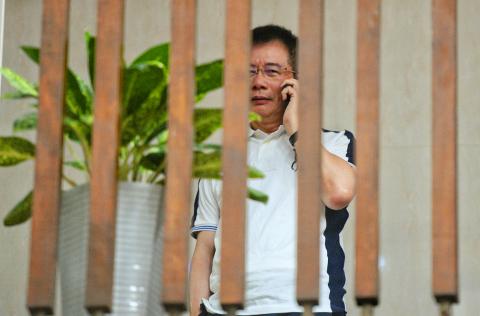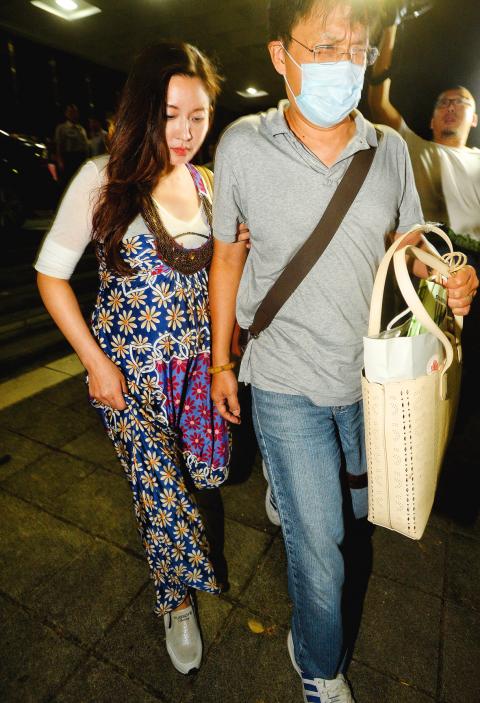The Taipei District Prosecutors’ Office early yesterday morning asked the court to detain former Chinese Nationalist Party (KMT) Central Policy Committee director Alex Tsai (蔡正元) for allegedly embezzling funds from the sale of Central Motion Pictures Corp (CMPC, 中央電影公司).
A hearing was still in progress at press time last night.
Tsai’s wife, Queena Hung (洪菱霙), has been confined to house arrest and prohibited from overseas travel following her release on Monday night on NT$3 million (US$98,782) bail.

Photo: Lin Cheng-kun, Taipei Times
Tsai late last month recused himself from any party position after he announced that he had been appointed chairperson of Jiangsu Min’An Automotive Co (敏安汽車) in China.
Tsai, former CMPC vice president Chuang Wan-chun (莊婉均) and Cheng Uei Precision Industry Co (正崴) chairman Gou Tai-chiang’s (郭台強) wife, Lor Yu-chen (羅玉珍), in 2006 raised NT$3.1 billion and jointly bought out CMPC, prosecutors said.
The shares were initially registered under Apollo Investment Co (阿波羅) — which was founded by Tsai — and were to be transferred to CMPC after accounts were cleared, prosecutors said.

Photo: Lin Cheng-kun, Taipei Times
Tsai allegedly gave Apollo NT$582 million under the guise of a capital reduction by convening an extraordinary shareholders’ meeting as president of Apollo, despite the company being only a nominal shareholder, and Lor being the actual owner of CMPC.
Tsai allegedly signed a contract with himself on behalf of Apollo, entrusting NT$430 million of the capital reduction funds to his name, prosecutors said.
Prosecutors accused Tsai of laundering money from Apollo through different accounts between 2007 and 2009.
A civil case filed by Gou against Apollo and Tsai in 2006 demanding the return of the capital reduction money might have also motivated Tsai to move the money, prosecutors said.
The Supreme Court in May last year upheld a ruling that Tsai must return NT$170 million to CMPC.
The alleged purchase of Chuang’s CMPC promissory note for NT$100 million that was withdrawn from Apollo, and NT$50 million for the alleged purchase of first-buying rights on any CMPC real estate — which CMPC did not agree to — were irregular trading activities that led to the suspicion of embezzlement, prosecutors said.
Tsai’s purchase of Forworld Electronics Co (福彥電子) shares in 2009 using Apollo funds — and then returning the funds in seven installments between 2009 and 2013 — was also suspicious, prosecutors said.
Tsai wired NT$65 million to his wife’s company, Chintsuan Co (金鑽), for investment in real estate in 2012 and 2013, which was not acceptable under the contract signed with his co-purchasers, the office said.
Meanwhile, former KMT chairperson Hung Hsiu-chu (洪秀柱) offered Tsai her support, saying that he was “a principled and honorable man.”
Previous investigations by the former Special Investigation Division (SID) found Tsai innocent, Hung said, adding that she was suspicious of the motives and timing behind the restarted investigation.
The government should not promote political oppression under the guise of a judicial investigation, Hung said.

GAINING STEAM: The scheme initially failed to gather much attention, with only 188 cards issued in its first year, but gained popularity amid the COVID-19 pandemic Applications for the Employment Gold Card have increased in the past few years, with the card having been issued to a total of 13,191 people from 101 countries since its introduction in 2018, the National Development Council (NDC) said yesterday. Those who have received the card have included celebrities, such as former NBA star Dwight Howard and Australian-South Korean cheerleader Dahye Lee, the NDC said. The four-in-one Employment Gold Card combines a work permit, resident visa, Alien Resident Certificate (ARC) and re-entry permit. It was first introduced in February 2018 through the Act Governing Recruitment and Employment of Foreign Professionals (外國專業人才延攬及雇用法),

RESILIENCE: Deepening bilateral cooperation would extend the peace sustained over the 45 years since the Taiwan Relations Act, Greene said Taiwan-US relations are built on deep economic ties and shared values, American Institute in Taiwan (AIT) Director Raymond Greene said yesterday, adding that strengthening supply chain security in critical industries, enhancing societal resilience through cooperation and deepening partnerships are key to ensuring peace and stability for Taiwan in the years ahead. Greene made the remarks at the National Security Youth Forum, organized by National Taiwan University’s National Security and Strategy Studies Institution in Taipei. In his address in Mandarin Chinese, Greene said the Taiwan-US relationship is built on deep economic ties and shared interests, and grows stronger through the enduring friendship between

CAUTION URGED: Xiaohongshu and Douyin — the Chinese version of TikTok — are tools the Chinese government uses for its ‘united front’ propaganda, the MAC said Mainland Affairs Council (MAC) Minister Chiu Chui-cheng (邱垂正) yesterday urged people who use Chinese social media platforms to be cautious of being influenced by Beijing’s “united front” propaganda and undermining Taiwan’s sovereignty. Chiu made the remarks in response to queries about Chinese academic Zhang Weiwei (張維為) saying that as young Taiwanese are fond of interacting on Chinese app Xiaohongshu (小紅書, known as RedNote in English), “after unification with China, it would be easier to govern Taiwan than Hong Kong.” Zhang is professor of international relations at Shanghai’s Fudan University and director of its China Institute. When giving a speech at China’s Wuhan

ENHANCE DETERRENCE: Taiwan has to display ‘fierce resolve’ to defend itself for China to understand that the costs of war outweigh potential gains, Koo said Taiwan’s armed forces must reach a high level of combat readiness by 2027 to effectively deter a potential Chinese invasion, Minister of National Defense Wellington Koo (顧立雄) said in an interview with the Chinese-language Liberty Times (sister newspaper of the Taipei Times) published yesterday. His comments came three days after US Secretary of State Marco Rubio told the US Senate that deterring a Chinese attack on Taiwan requires making a conflict “cost more than what it’s worth.” Rubio made the remarks in response to a question about US policy on Taiwan’s defense from Republican Senator John Cornyn, who said that Chinese